Is your skin care routine ruining your face?
Choosing the right ingredients and products for your skin could take lots of trial and error. So it’s important to identify the signs that a product is not a good fit for your skin before it causes damage. Here’s what dermatologists want you to watch for when testing a new product—and signs you should take it out of your routine.
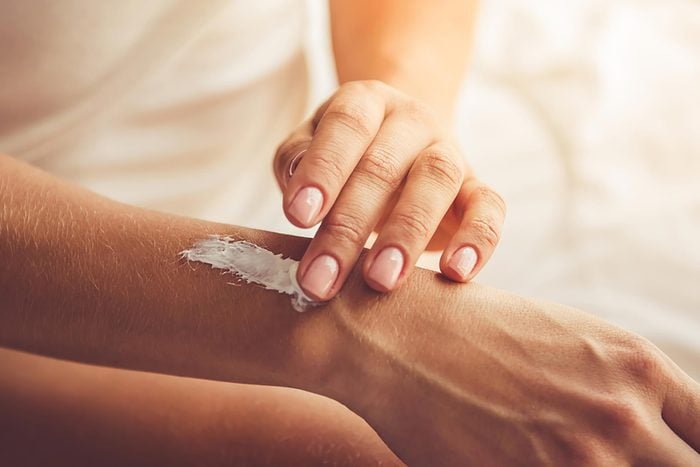
Intense burning or stinging when using a product for the first time
Whether it’s a cleanser, lotion, or mask—no skin care product should cause burning or stinging. “This is often a sign that you’re allergic to it,” explains S. Manjula Jegasothy, MD, dermatologist, and founder of Miami Skin Institute. Also known as contact dermatitis, this reaction is your skin’s defense mechanism to shield itself from the offending ingredient, whether it’s a fragrance, preservatives, or other additives. “Some enzyme and acid-based masks can cause mild stinging of the skin for about a minute, but, if your skin feels like it’s on fire, do not suffer in the name of beauty—wash it off!” says Alan J. Parks, MD, board-certified dermatologist and founder of DermWarehouse. “You’re either allergic to something in the product or your skin is simply too sensitive for whatever it contains.”
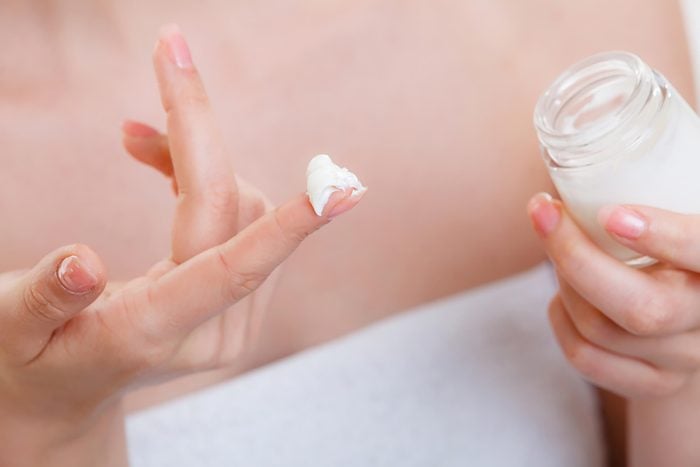
You notice a slight burning or stinging when using a product you’ve used before
This scenario is different than if you were using a new product for the first time. Your skin has already shown that it can handle whatever ingredients the product contains. “Slight stinging and burning are common side effects (especially those that have an alcohol or ‘drying’ base) in patients with pre-existing skin sensitivity, such as eczema or rosacea,” says Terrence Keaney, MD, board-certified dermatologist. “In patients with sensitive skin, it’s important that they carefully select products that are designed for their skin type.” Another possibility is that you’re simply using too much of the product or using it too frequently. “Generally, a pea-sized amount of product is enough to cover the entire facial surface for any given product,” says Dr. Jegasothy. “Do not use more than this, and don’t use it more frequently than recommended; more is not more when it comes to skin care.” Make sure you’re using the best bed sheets for sensitive skin, too.
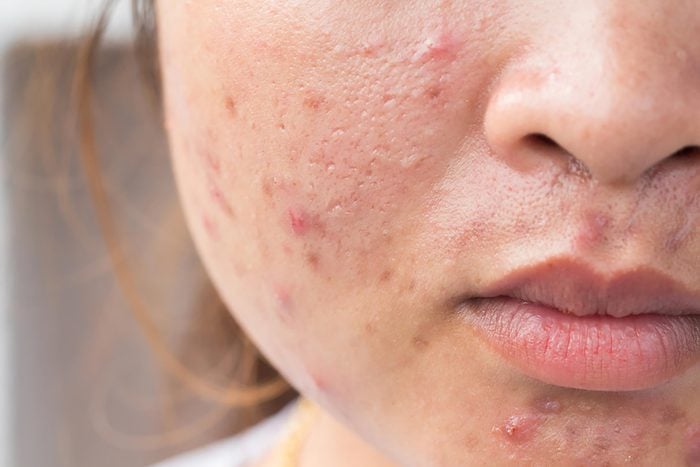
You experience excessive dryness, flaking, and peeling
If you’ve got this going on, particularly around your nose and at the corners of your mouth, you might be simply overusing an acne product, such as a retinoid or a benzoyl peroxide. “Topical retinoids are used to help lightly exfoliate skin, regulate skin cell maturation, and cause mild irritation in the skin, which encourages new collagen growth,” explains Tsippora Shainhouse, MD, board-certified dermatologist in Beverly Hills, California, and clinical instructor at the University of Southern California. “They’re meant to slowly diminish the appearance of fine lines, even skin pigmentation, and thicken skin for a younger look. However,” she adds, “if they’re causing too much irritation, to the point that you’re constantly peeling and your skin is red and sensitive, this might not be the best anti-aging treatment for you.”
Chronic inflammation actually can stress the skin and accelerate skin aging, so try cutting back your prescription retinoid to once or twice weekly and layer it with a gentle moisturizer. If it’s still too irritating, try over-the-counter, plant-derived retinol, which will be milder. If this is still too irritating, consider avoiding this class of topical medication.
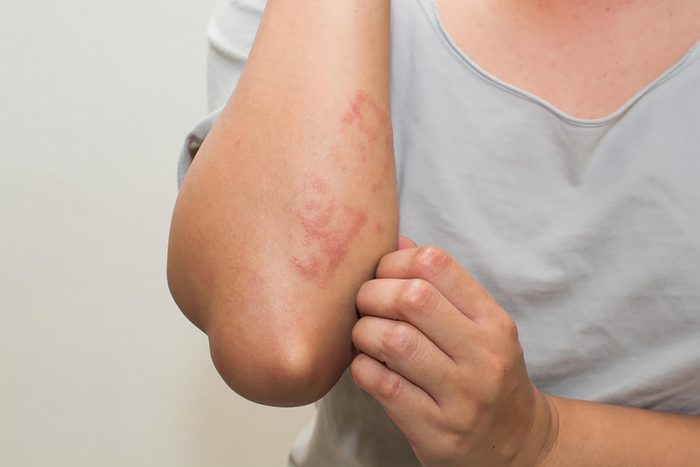
You get a rash from the product or blisters start to form where you applied it
It’s tempting to sample a product with the most eye-catching packaging or one that you read about in online, but just because it works for one person doesn’t mean it’s a universal wonder. “In addition to the magic active ingredient that a product is touting, it can contain many potentially irritating or allergenic inactive ingredients that contribute to its silky feel, fancy fragrance, or prolonged shelf life,” warns Dr. Shainhouse. “If you do develop a rash after a couple of applications, it’s most likely due to one of the preservatives, fragrances, or chemicals called acrylates.” Consider getting allergy patch testing at your dermatologist’s office to determine which is the offending agent, so you’ll know which ingredients to look out for in the future.
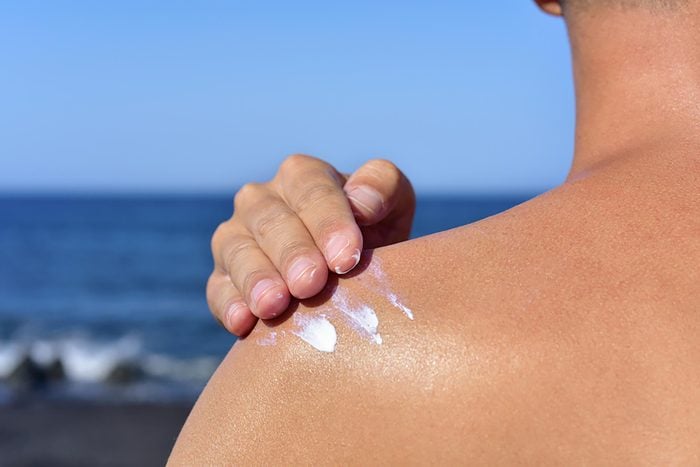
You develop any sudden pigmentation changes
If you notice freckles, brown spots, or a sunburn on your skin, you’re most likely not using a strong enough sunscreen. But if you notice pigmentation changes, particularly on your cheekbones, after applying a new product for a few days to a week, this can be a rare allergic reaction to certain ingredients that cause actual lightening of brown spots. Dermatologists call this a paradoxical hyperpigmentation and it’s usually related to botanicals that lighten the skin, such as kojic acid, arbutin, and hydroquinone. “Discontinue all skin care containing these products and simply wait for the skin to balance itself out,” says Dr. Jegasothy. “Using another skin lightener or bleaching cream at this time can make the condition worse.” And, no matter what products you’re using, always make sure to apply a broad-spectrum SPF, of at least SPF 30 every day, rain or shine, directly after cleansing and before your moisturizer or makeup to ensure full protection. (Don’t miss these sunscreens dermatologists actually use.)
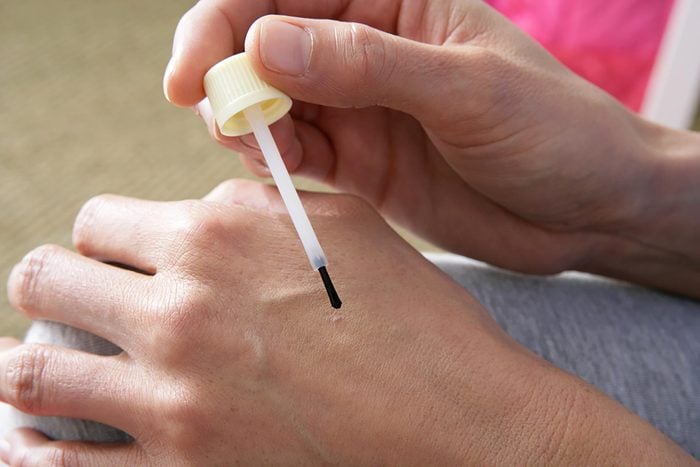
Your skin is red and irritated after using an acne treatment
Adult acne is usually not caused by the same bacteria and oil that triggers teen acne. That means that harsh topical treatments like salicylic acid and benzoyl peroxide designed for teenage pimples can actually irritate and dry out the top layers of the skin in adults, which will make your skin more red and sensitive and can actually aggravate your acne. First thing’s first: Make sure the products you’re using are non-comedogenic and do not contain mineral oil, cocoa butter, or other pore-clogging ingredients. “You may need prescription medications that are strong, but less harsh on your skin,” says Dr. Shainhouse. “And, sometimes, it means finding a vehicle that makes it more tolerable.” See your dermatologist to figure out the best treatment plan for your skin and acne type.
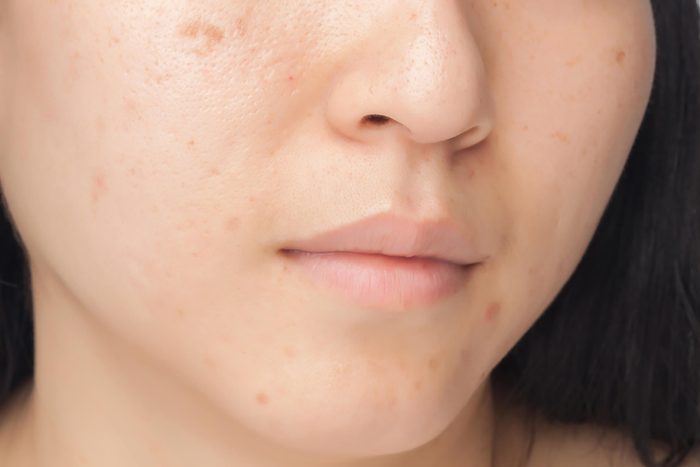
Your skin is more oily than usual after using a new product
If you find your skin is suddenly slicker than normal, it could be a sign that you’re stripping it of its natural oils. Your skin naturally acts as a barrier to keep out dirt and other free radicals in the environment. It does this by arming itself with a healthy balance of oils that keep moisture in. Over-washing or using a product that strips your skin of this natural oil is bad for maintaining that barrier. “If you’re using harsh products or not enough moisturizer, your skin will overcompensate for it and produce even more oil,” explains Eric Schweiger, MD, dermatologist, founder of Schweiger Dermatology Group. “Look for a moisturizer or serum containing hyaluronic acid rather than oils to hydrate the skin and use a gentle cleanser.”
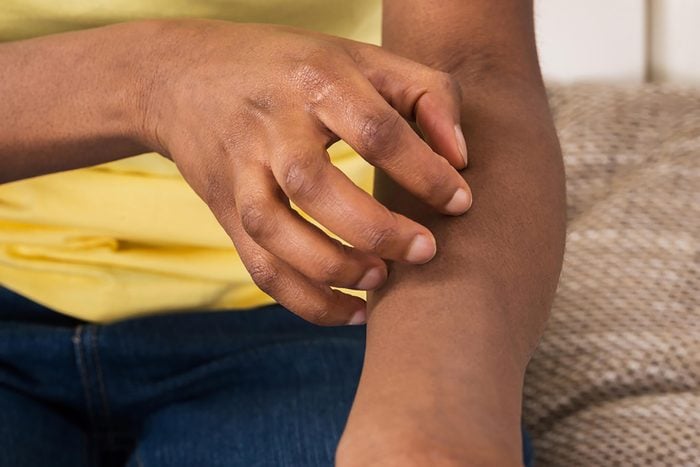
You develop generalized itching all over your body
If this happens, it’s possible that you’re having a histamine (allergic) reaction to your skin product, or possibly to something you inhaled or ingested. “I would suggest discontinuing all skin care and then adding one product back at a time for a week each to see if the generalized itching restarts or persists,” says Dr. Jegasothy. It takes at least two to three weeks for an allergy to “wash out” of your system, so allow that much time before reintroducing your regimen one product at a time. “An oral antihistamine that’s commonly available over the counter, such as Zyrtec or Claritin (not Claritin-D), can also be very effective in reducing histamine in the skin and therefore reducing the symptoms of this kind of generalized itching much more quickly.”
Next, make sure you know these 9 reasons why your skin hates you.
